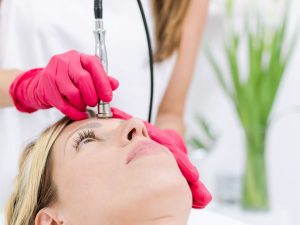 Are you looking for a non-invasive treatment to help your skin look better? You might want to consider microdermabrasion. How does microdermabrasion help your skin glow? In this post, we’ll describe how the treatment works.
Are you looking for a non-invasive treatment to help your skin look better? You might want to consider microdermabrasion. How does microdermabrasion help your skin glow? In this post, we’ll describe how the treatment works.
How Does Microdermabrasion Work?
Microdermabrasion gently exfoliates by working tiny crystals into your skin using a handheld wand. The crystals are then whisked away by vacuum along with the loosened dead skin cells, dirt and other impurities. The vacuum sensation will stimulate the skin’s blood supply and will encourage the regeneration of collagen and elastin. What’s left behind is a fresh layer of glowing skin that will feel tighter and look younger.
What Kind Of Skin Conditions Can Microdermabrasion Treat?
While you don’t need to have a specific type of skin condition to receive a microdermabrasion treatment, people who suffer from acne scars, age spots, sun spots, enlarged pores, fine lines or dark patches often benefit the most. Undergoing the process can reduce the appearance of these conditions and give your face a fresher, younger, glowing appearance.
Does Microdermabrasion Hurt?
During the microdermabrasion treatment, it may feel like your skin is being licked by a cat’s rough tongue with some slight pulling. The treatment is gentle enough that it doesn’t break the skin, so it’s exceptionally rare for a client to experience pain. After the treatment, the skin may exhibit some redness and slight puffiness similar to a slight sunburn, but this will typically subside after a few hours. There’s no downtime associated with a microdermabrasion treatment so it’s no problem to have it performed on your lunch break or before an important event.
How Long Does A Microdermabrasion Treatment Last?
Microdermabrasion treatments are usually sold in packages of four to six appointments scheduled once a month. The regularity of your treatments will depend on your age, skin type, how often your skin is exposed to the elements and personal preference. Each treatment usually only takes about 15 to 30 minutes to perform.
Are Microdermabrasion Treatments For Everybody?
There are certain conditions which may cause your dermatologist to advise you to avoid dermabrasion treatments. These include severe acne, rosacea, cold sores and sometimes those who are using a topical retinoid. Your dermatologist will be able to help you decide if dermabrasion is inappropriate for you.
 Leeza has been operating a hair removal business since 1987, starting with electrolysis services and then evolving to laser hair removal and laser skin treatments. Being aware of the many different types of laser hair removal technologies available, her method of choosing a successful product was to personally undergo the procedure herself...
Leeza has been operating a hair removal business since 1987, starting with electrolysis services and then evolving to laser hair removal and laser skin treatments. Being aware of the many different types of laser hair removal technologies available, her method of choosing a successful product was to personally undergo the procedure herself...